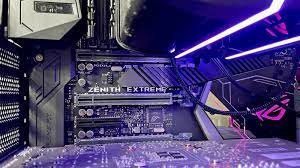The benefits of updating your PC’s BIOS are often underestimated. After all, the process of updating it is scary enough—if something goes wrong, your PC could become a paperweight. In addition to the perceived lack of notable benefits, this means that many people are not actively doing it unless they really need to.
In fact, frequent BIOS updates are released for a reason. Here are some of the top reasons why you should give up on your fears and finally pull the trigger on that BIOS update you’ve been putting off for so long.
1. Additional Hardware Support
One of the main reasons people update their BIOS is simple—with a BIOS update, you can use hardware you weren’t able to use before.
The most common example of this is the CPU. While new CPUs launch every one or two years, CPU sockets last longer than that. And while the socket may be the same, you can’t take an old motherboard and stick a new CPU on it and expect it to work out of the box. Instead, motherboards are made compatible with those chips by issuing a BIOS update for them after the fact.
Thanks to a BIOS update, AMD Ryzen AM4 motherboards purchased in 2017 were able to enjoy multiple generations of new AMD CPUs, allowing an upgrade from a first-gen Ryzen CPU to a powerful, 5000-series Ryzen without changing the motherboard or most of the hardware It became possible to do , Intel is a bit more prone to socket switching than it normally does every couple of years, but if you have a 12th generation Intel CPU and want to upgrade your PC to 13th generation, you can still You can do this with a BIOS update. , Of course, there are features these chips support that these motherboards don’t have, such as PCI Express Gen 4 support, but the chip will work with your PC should that be the one you want.
BIOS updates may also add support for other hardware upgrades, such as RAM. Basically, if a new component, whatever it may be, fits and can be installed on your computer but doesn’t work properly, there is a very real chance (depending on the motherboard manufacturer) is) that there is a BIOS update that can fix this.
2. Security Updates
Then, we have security updates. The mention of the words “security” and “patch” in a software update makes some people immediately blink, and we can understand why. But in today’s time the importance of keeping your PC secure cannot be underestimated.
Sure, we don’t interact with our BIOS a lot when it’s absolutely necessary. And the operating system your PC is running on, be it Windows 11 or something else, keeps getting updated frequently. But just as it’s important to protect your operating system, you also need to protect what’s underneath.
A secure operating system should keep any potential threats away, and it often does, but if something malicious finds its way into your motherboard, things can go awry very quickly. BIOS tampering, as well as boot sector viruses, do exist, and they can do a lot of damage to your PC.
If a BIOS security update is released, it’s often for a reason. A vulnerability is found, and the update fixes that vulnerability. An example of this was a BIOS update released for hundreds of Lenovo laptops that fixed a handful of security vulnerabilities that an attacker could exploit to read SMM memory or execute arbitrary code. Of course, most security updates are minor, and they’re unlikely to affect you. But doubling up on your PC’s security is never a bad idea.
3. Improve stability
Lastly, this is a minor reason, but it’s still important, as it can sometimes be a nuisance depending on the system.
Bugs and other issues are often found and fixed at the BIOS level on the motherboard. Sure, we don’t interact with our BIOS a lot, but it’s not really like you’re going to notice it’s there if you do. Instead, BIOS problems can manifest themselves in other ways.
For one, they can surface on your operating system in the form of system/app bugs, slow-downs, non-functioning peripherals/hardware components, or even blue screens of death/kernel panics. If you’ve noticed an annoying problem with your PC that has persisted over multiple updates (even though you’ve reported it hundreds of times) and it still somehow hasn’t been fixed, you may need to check and see Can you see if this is a problem at the BIOS level, and whether there is an update that fixes that problem.




